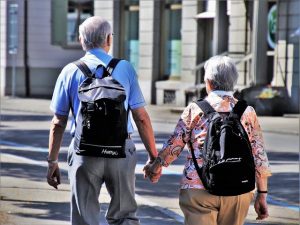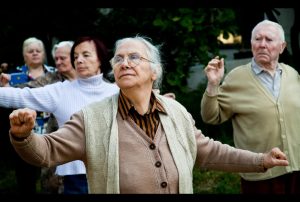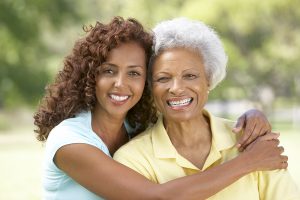Grandparents Raising Grandchildren Series: When Grandma Becomes Mama
Being a Grandmother is a wonderful benefit of aging. The experience is truly all that your friends told you it would be. When you didn’t think you could love anyone as much as your own children, your grandchildren come along and prove you wrong. You can spoil them and send them home, feed them junk food and cookies for dinner, snuggle and take time to play like you didn’t have time for when you raised your own kids. And the best part is that all those things that would have made you a bad parent then, make you an awesome, fun Grandma now.
But what happens when, for reasons beyond your own control, your find yourself moving from the role of Grandma to Mom? According to the Profile of Older Americans (2016), “approximately 1 million grandparents age 60 and over were responsible for the basic needs of one or more grandchildren under age 18 living with them in 2015. Of these caregivers, 593,495 were grandmothers and 429,377 were grandfathers” (pg. 15). The role change from Grandma to Mama is a significant one. The little one you have spoiled and coddled is now yours to raise for the next 20 years into adulthood. This can be a shocking transition, but also a tremendous blessing.
This surprise happened to me at the age of 57. My husband had just retired and we had relocated to a more relaxing place in our life. We already had 7 children between us with an age span of 15 – 34 years of age, the last two of whom were adopted from Russia. So, when our teenagers were ready to graduate from high school, we were looking forward to being empty nesters, having raised children for many years.
Then, along came JJ. Substance abuse, which our pediatrician calls “the scourge of our community”, was the culprit that led to our current situation. This is a common problem, although not all children of substance abusers are fortunate enough to be placed in a loving home out of the influence of parents who use drugs. Our journey started when we offered to take our 6 week old grandson for a few hours so his parents could enjoy some free time together. Those hours turned into several days when the parents didn’t show up to get their son and nobody could find them. They didn’t call to check on him and seemed not to mind that they didn’t contact us for days. It wasn’t long before CPS removed little JJ from his birth parents due to their substance abuse and neglect of their infant and placed him with both sets of grandparents sharing temporary kinship care. Unable to break free of the chains of drugs, even with unlimited free resources and counseling provided by the community, JJ’s parents lost custody of him permanently and we became new parents again through adoption of our precious grandson.
The process of adapting to this life-changing event affects everyone differently. If you find yourself in a similar life-altering stage, then you may benefit from this series on Grandparents Raising Grandchildren. Today’s tips are for Grandmas who are now Moms again:
Some things have changed
If you are anything like me, your last biological child may be in his/her 30’s, so raising a little one might be a bit intimidating. Lots has changed in 30 years! There is so much more technology to help children learn and play. But this means we have become more tech savvy and not avoid the latest cellphones, computers, or apps. (Any teenager is happy to help you learn to be more techie). Toys are more fun now. Clothes are cuter. There are great innovations like disposable diapers, better bottles, and on-the-go baby food. Kids go to preschool and all-day kindergarten now. But, there are negatives too, like many more immunizations to keep track of. The world doesn’t seem as safe in the big cities as it did long ago when we let our children play outside without as much fear of gang violence, guns, or being kidnapped. Yet, there are more guidelines for child-rearing, research on how to educate kids, and better job opportunities for when they are grown. While all these changes may be daunting, you can use them to your benefit and to make your life easier when raising children in your later years.
Some things never change
Fortunately for us, some things never change. Babies are babies, kids are kids, and teenagers are still teenagers. Changing diapers, bathing a baby, suctioning a nose with the blue bulb syringe, putting clothes on a wiggly toddler, and rocking a little one to sleep are still the same. Strategies for teaching math have changed, and maybe kids don’t always have books in high school, but the major concepts of the major subjects are ones you will remember. Don’t worry – this will all come back to you and you might be surprised how much better you are at parenting now than when you raised your first set of children. You are more relaxed and comfortable because you have decades of experience to draw on.
Your experience is a plus
One of your best assets as a new Grammy Mama (as I like to call this role) is your experience. For me, I raised or help raise 7 children before JJ, so I am way ahead of the new mother learning curve. We already know what works and doesn’t work in raising kids. We are not novices, but seasoned experts! So, when you are tempted to feel you are not up to this new challenge, remind yourself that this is not your first rodeo.
You are not too old
It is a normal feeling to think you might be too old to raise another child. Let me assure you that you are not, and you are not alone. There are more than a million other grandparents in America just like you who are doing it, and many are older than you are. Your age gives you wisdom and experience. If you were in another job, you would be a Senior Executive, VP, or CEO – that is what you are in this new job. Embrace your Grammy Mama role. There is a reason why this child (or children) has been entrusted to you. You have been chosen for a remarkable task: to nurture a child who will later thank you for not giving up on him. You are never too old to undertake such a legacy as that.





